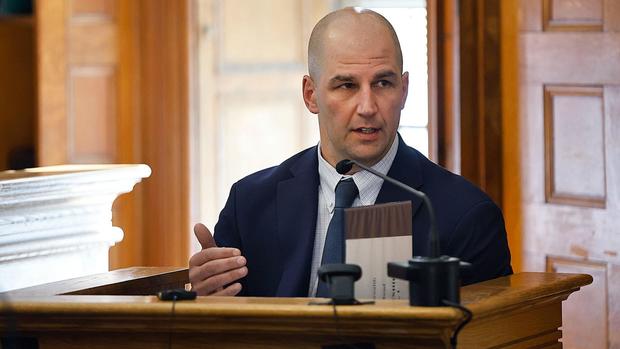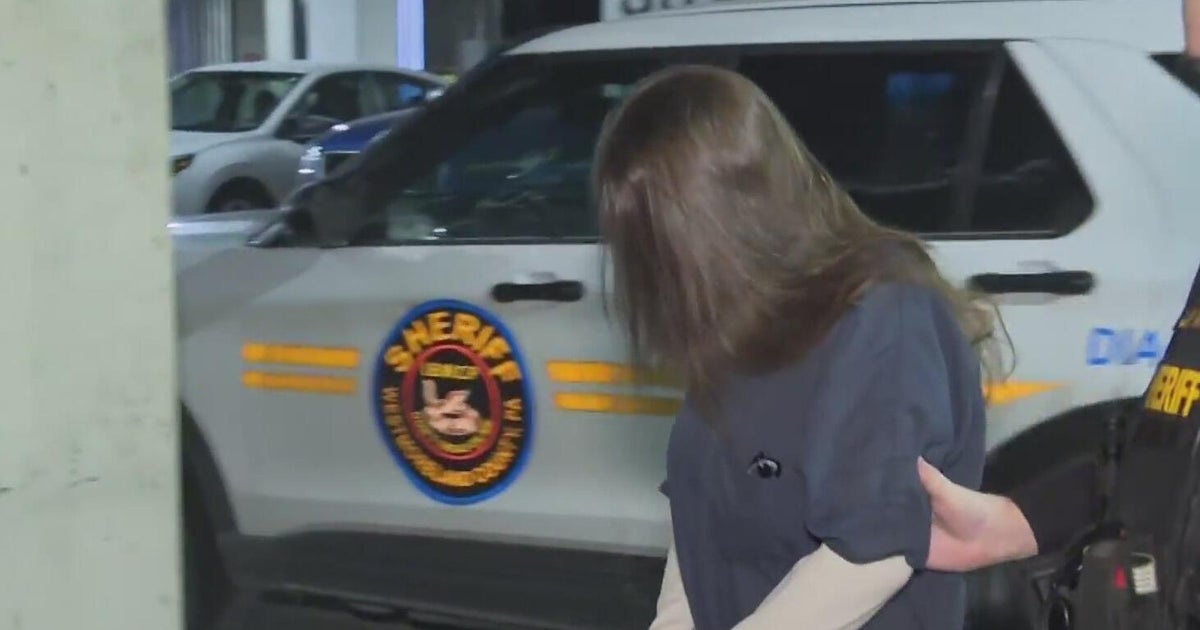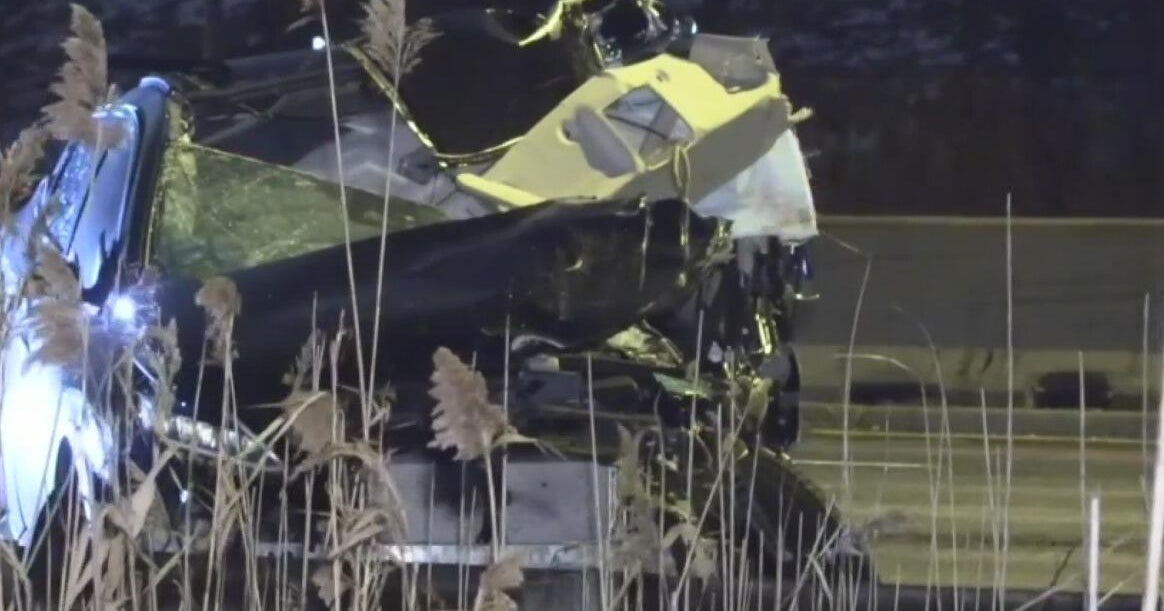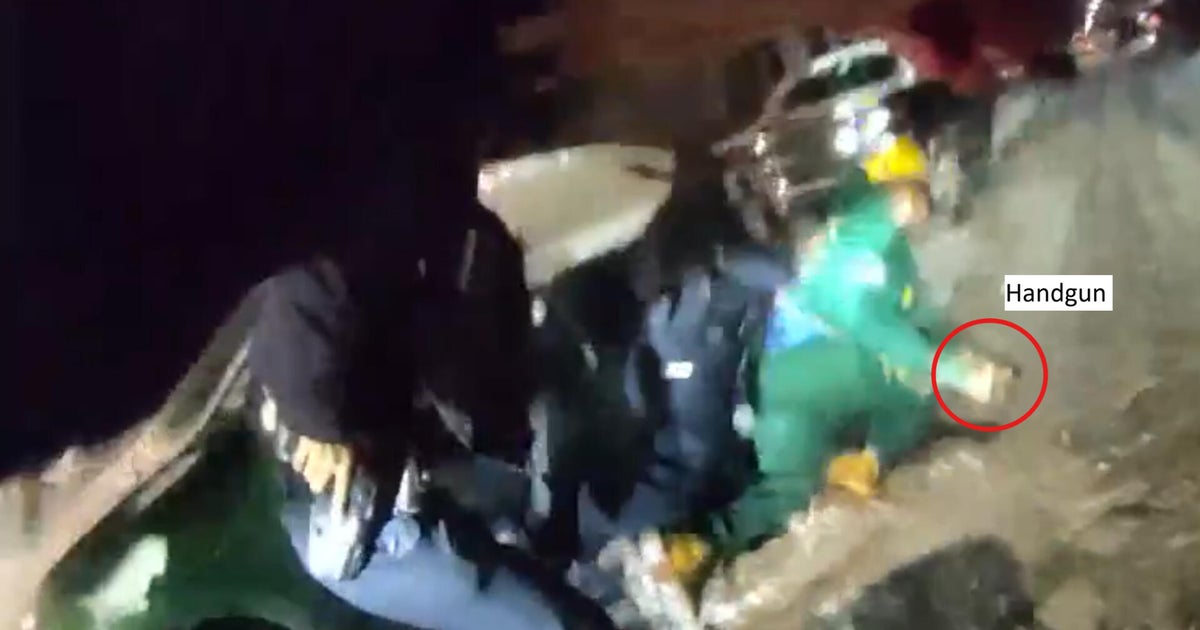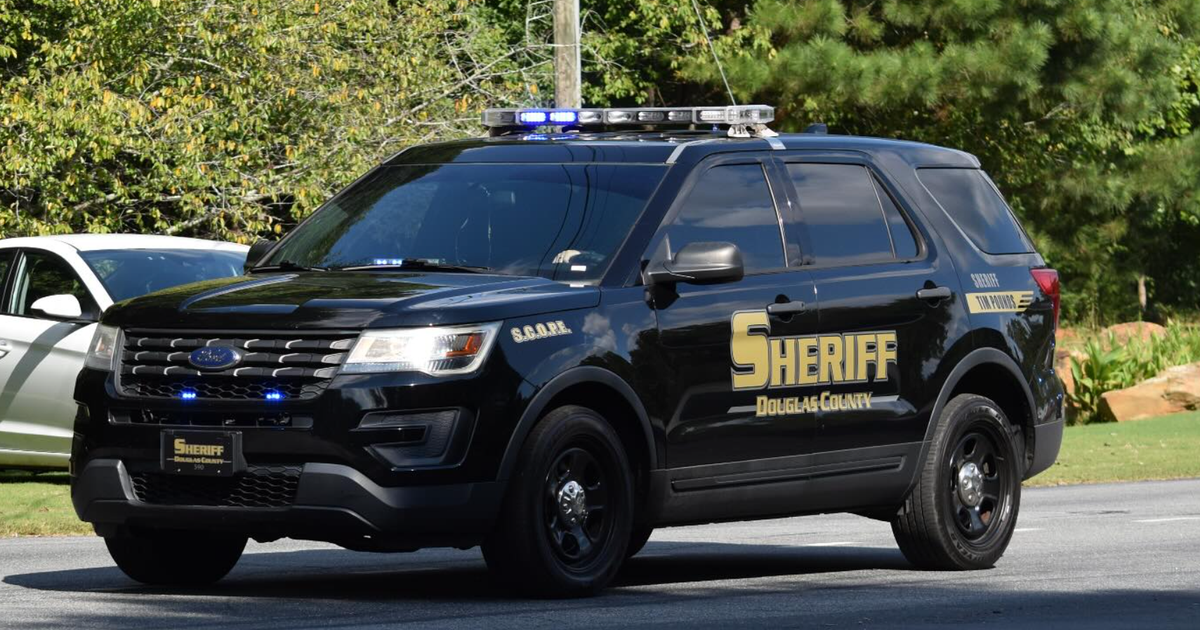Trooper Michael Proctor grilled over "hopefully she kills herself" text in Karen Read murder trial
DEDHAM – Massachusetts State Police Trooper Michael Proctor was back on the stand for continued cross-examination on Wednesday in the the high-profile Karen Read murder trial. Proctor was the lead investigator in the case, and on his first day of testimony was forced to read derogatory messages he sent about Read to friends and fellow troopers.
Prosecutors say Read hit and killed her boyfriend, Boston police officer John O'Keefe, with her SUV in January 2022 and left him to die in the snow. Defense attorneys argue O'Keefe was killed during a fight inside Brian Albert's home at 34 Fairview Road.
Proctor's text messages were brought to light as part of a federal investigation into the handling of the case, though jurors cannot be told about that probe. On Monday, Proctor called the messages "unprofessional and regrettable."
Read's defense attorney Alan Jackson cross-examined Proctor, who remains on full duty but is currently under investigation by Massachusetts State Police for unspecified reasons.
Trooper Proctor asked if he developed "hatred" for Karen Read?
In a text message response to his sister that he read in court, Proctor said about Read, "Hopefully she kills herself."
"You literally said that you hope Karen Read, the subject of your investigation … that she would just die," Jackson said, prompting Proctor to respond "It was a figure of speech."
Jackson asked Proctor if he developed "some sort of hatred for Ms. Read at any point during this investigation."
"We followed the facts and evidence which showed Ms. Read hit Mr. O'Keefe with her vehicle. Yes, at times I got emotional because of that and I said some stuff, texted some things I shouldn't have. But it was based off the evidence," Proctor said.
Jackson finished his cross-examination just after 2 p.m. on Wednesday.
"Trooper Proctor. It would be far easier for you to pin it on 'the girl' who's just a 'whackjob [expletive]' in your words, who you hope just kills herself. Right?" Jackson said, before ending by saying "Shame on you sir."
That prompted Judge Beverly Cannone to strike the remark from the record and warn Jackson.
"Jurors, disregard that. I've told you before, lawyers can't make comments, they can ask questions. And Mr. Jackson you know better than that," Cannone said.
After court, defense attorneys felt Proctor's testimony cemented a future Karen Read acquittal.
"Beyond any reasonable doubt, it's beyond any doubt," Jackson said. "I've never seen anything like it. Like, everything he has touched has been compromised."
Defense says Brian Higgins had motive, means to kill John O'Keefe
Earlier, Jackson questioned Proctor about Bureau of Alcohol, Tobacco, Firearms and Explosives agent Brian Higgins, who testified earlier in the trial.
Higgins said that he and Read exchanged "flirty" text messages in the months before O'Keefe died.
Higgins was at the Waterfall Bar and Grille in Canton drinking with the group that included Read and O'Keefe before they went to Brian Albert's Fairview Road home.
Jackson asked Proctor if Higgins "at least had a motive" to kill O'Keefe because Read had ignored his text messages while at Waterfall.
The defense attorney also asked if Higgins was physically capable of killing O'Keefe during a fight.
"You also recognize that Brian Higgins certainly had the means to commit the crime, correct?" Jackson asked. "He's a big guy. He certainly had the physical ability to get into a physical altercation with John O'Keefe, correct?"
Proctor said he could not agree because he was not aware of Higgins' fighting abilities.
"Just because he's a big guy doesn't mean he has the motive to hurt Mr. O'Keefe. They were friends," Proctor said.
Defense focuses on Colin Albert
Brian Albert, a former Boston police officer, owned the home at 34 Fairview Road in Canton at the time O'Keefe's body was found in the snow.
Jackson, as he did earlier in the trial, zeroed in on Colin Albert's presence at the home the night O'Keefe died. Defense attorneys claim that Colin Albert, who has already testified, could have been one of the people who killed O'Keefe during an alleged fight inside the home.
In Proctor's notes, he listed people who were inside 34 Fairview Road at some point January 28 into January 29, 2022. Colin Albert was not included in those notes.
"Isn't it true that in your report you excluded one name, Colin Albert, from the list of individuals that were in your notes," Jackson asked. Proctor testified that he didn't include Colin Albert because he arrived later in the evening, while others who he wrote down were there from the start.
Several witnesses have testified that Colin Albert was at the home, but left before O'Keefe and Read arrived.
Trooper Proctor's relationship with Albert family
Proctor testified that he knew Brian Albert's brother, Christopher, and his wife Julie, as well as their son Colin.
On February 24, 2022, about one month after O'Keefe's death, Julie Albert sent Proctor a text message.
"This is the weekend I've been waiting for. Michael please send skiing videos if [Courtney Proctor] doesn't," the message said, referencing Michael Proctor's sister.
Ten days before O'Keefe's death, Michael Proctor messaged Julie Albert about babysitting his children.
Jackson said the messages show Trooper Proctor has a closer relationship with the Albert family than he has testified to.
Proctor and a fellow trooper interviewed Julie and Christopher Albert about O'Keefe's death. A short time later, Trooper Proctor's sister texted him "How did it go at Julie's? She was so nervous" and he responded "Hahahaha why?" then said "It was fine! Just a quick convo."
"Zero chance she skates," Proctor told friends
Jackson displayed a text message between Proctor and friends where the trooper said "Zero chance [Read] skates. She's f----d."
"Seventeen hours into this investigation, you made the decision that you were going to put it on Ms. Read, didn't you? Put the case on Ms. Read. She's going to catch the case, correct?" Jackson asked.
Proctor said "No. Absolutely not."
"After the day's investigation with multiple troopers conducting multiple tasks, a debriefing at Canton PD amongst detectives in my office, we went through the overwhelming amount of evidence against Ms. Read that she struck Mr. O'Keefe with her vehicle. That's what I meant by that comment," Proctor said.
Proctor said intent "another animal we won't be able to prove"
Jackson attempted to show that the trooper was biased early on in the investigation.
"Before you ever went into the house, only having interviewed three folks, you had this case nice and wrapped up didn't you?" Jackson asked.
"Based on the evidence my office uncovered that day, the one shoe discovered at the scene, the one shoe at the hospital, Mr. O'Keefe's injuries, the broken taillight pieces underneath the snow," Proctor said before Jackson interrupted and asked if it was "cut and dry" in the trooper's mind. "Yes," he responded.
In a group text with high school friends, Proctor referenced if it was intentional or not, and said "That's another animal we won't be able to prove."
Jackson asked "Did you mean by that statement that you were going to pursue this case no matter what the proof might be?"
"What I meant by that statement was if Ms. Read backed into Mr. O'Keefe intentionally or not," Proctor said.
Trooper Michael Proctor's text messages
Proctor's text messages were the main focus when he took the stand as a prosecution witness on Monday.
Among the messages Proctor read in court was one where he called Read "a whackjob [expletive]." In another message, Proctor said to a colleague, "She's gross. F--- her. B----."
When Proctor was searching Read's phone as part of the investigation, he texted his superiors "No nudes yet."
"These juvenile, unprofessional comments have zero impact on the facts and the evidence and the integrity of this investigation," Proctor testified Monday. "These are unprofessional comments, but they absolutely did not detract from the integrity of the investigation or the facts and evidence of it."
Read was asked about the messages while leaving court on Monday.
"I've done nothing wrong. He has," Read told WBZ-TV's Kristina Rex. "You might want to ask him how he feels hearing that read in open court. I am not ashamed or embarrassed."
Lt. Brian Tully takes stand
Massachusetts State Police Lt. Brian Tully took the stand to end the day of testimony on Wednesday after Proctor stepped down. Prosecutor Adam Lally asked Tully, who leads the detective unit at the Norfolk County district attorney's office, if he became aware of the text messages on Proctor's personal phone.
"I had a long discussion with him about the content and nature of them," Tully said. "I expressed my displeasure at his unprofessionalism and the content of them, and then I reported it up my chain of command."
Tully also says he "admonished" Proctor over the texts.
Juror dismissed from trial
One juror is no longer participating in the case due to personal reasons not related to the trial.
After that person was officially dismissed on Wednesday, the jury now consists of 16 people.
There are 10 women and six men on the jury.
Who is Karen Read?
Read is a 45-year-old woman from Mansfield, Massachusetts, who is charged with second-degree murder, manslaughter while operating under the influence of alcohol, and leaving the scene of personal injury and death.
She has pleaded not guilty to hitting and killing O'Keefe, and claims she is the victim of an elaborate coverup by people including law enforcement. According to testimony from previous witnesses, O'Keefe and Read had what was described as a deteriorating relationship.
What's the schedule for the Karen Read murder trial this week?
Judge Beverly Cannone has been attempting to hold full days of testimony as often as possible in order to speed up proceedings. Last week the judge told jurors she plans for them to be able to deliberate by the end of June.
Full days of testimony are planned this week for Wednesday, Thursday and Friday. There was no court on Tuesday.
At least part of one day this week is likely to be spent with attorneys questioning potential defense witnesses without the jury present.
